In recent years, Artificial Intelligence (AI) has been increasingly integrated into various aspects of healthcare, revolutionizing the way treatment plans are developed and patient care is delivered. One of the most significant applications of AI in healthcare is personalized medicine, where AI-driven algorithms analyze patient data to tailor treatment plans and interventions to individual needs. In this article, we’ll explore the role of AI-driven personalization in healthcare and its impact on improving patient outcomes and enhancing the overall quality of care.
Understanding AI-driven Personalization in Healthcare
AI-driven personalization in healthcare involves the use of advanced algorithms and machine learning techniques to analyze large volumes of patient data, including medical records, genetic information, imaging studies, and real-time monitoring data. These algorithms identify patterns, correlations, and insights that human clinicians may overlook, enabling healthcare providers to deliver more targeted and effective interventions.
One of the key components of AI-driven personalization in healthcare is predictive analytics, where AI models forecast patient outcomes and risks based on historical data and patient characteristics. By predicting disease progression, treatment response, and adverse events, healthcare providers can proactively intervene to prevent complications and optimize patient outcomes. Moreover, AI algorithms can identify patients who are at high risk of certain conditions or complications, allowing for early intervention and personalized preventive strategies.
Customizing Treatment Plans
AI-driven personalization enables healthcare providers to customize treatment plans based on individual patient characteristics, preferences, and needs. By analyzing genetic data, biomarkers, and other clinical parameters, AI algorithms can identify the most effective treatment options for each patient, minimizing trial-and-error approaches and optimizing therapeutic outcomes.
For example, in oncology, AI algorithms can analyze tumor genetics and drug response data to recommend targeted therapies that are most likely to be effective for specific cancer subtypes. Similarly, in chronic disease management, AI-driven decision support systems can assist clinicians in selecting the most appropriate medications, dosages, and treatment regimens based on individual patient profiles and comorbidities.
Enhancing Patient Care
AI-driven personalization not only improves treatment efficacy but also enhances the overall patient experience and satisfaction. By analyzing patient preferences, lifestyle factors, and social determinants of health, AI algorithms can tailor care plans to align with patients’ values and goals, promoting greater engagement and adherence to treatment.
Furthermore, AI-powered virtual assistants and chatbots can provide personalized health education, reminders, and support to patients outside of traditional clinical settings. These digital health tools empower patients to take a more active role in managing their health and wellness, leading to better self-management and improved outcomes.
Challenges and Considerations
Despite its potential benefits, AI-driven personalization in healthcare presents several challenges and considerations. One concern is the need to ensure the privacy and security of patient data, particularly in light of stringent regulatory requirements such as HIPAA. Healthcare organizations must implement robust data governance and security measures to protect sensitive patient information from unauthorized access or breaches.
Additionally, there is a risk of algorithmic bias and discrimination if AI models are trained on biased or incomplete datasets. Healthcare providers must carefully evaluate AI algorithms for fairness, transparency, and accuracy to avoid perpetuating disparities in healthcare delivery and outcomes.
Conclusion
In conclusion, AI-driven personalization holds immense promise for transforming healthcare by customizing treatment plans and patient care to individual needs. By leveraging advanced algorithms and predictive analytics, healthcare providers can optimize therapeutic outcomes, enhance patient engagement, and improve the overall quality of care. However, addressing challenges such as data privacy, algorithmic bias, and regulatory compliance is essential to realizing the full potential of AI-driven personalization in healthcare. As technology continues to evolve, AI will undoubtedly play an increasingly prominent role in delivering personalized, precision medicine to patients worldwide.

